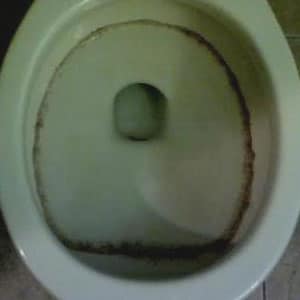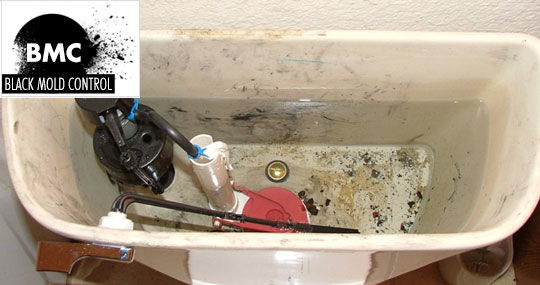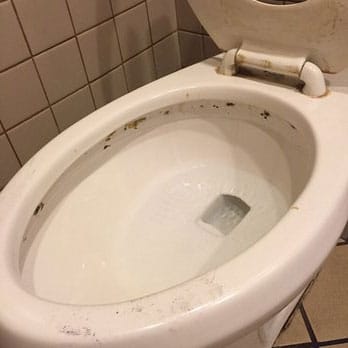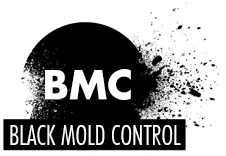How to remove mold from toilet bowl, tank and seat
At some point, black mold in toilet happens to everyone. You lift the lid on a toilet bowl only to be greeted by a ring of black mold. It could be in your home or in a friends’. You stare at it, wondering if you want to do your business, after all. You question if it’s even safe to squat down. If you’re at a friends’ house you have to deal with it, maybe by using excessive amounts of toilet paper. But if you’re at home, this is your wake-up call. You have to handle the problem and fast. In addition to its unsightly appearance, toilet mold can be potentially hazardous to your health, especially if you have allergies or are exposed to it for long periods of time.

Table of Contents
Read the Frequently Asked Questions (FAQ) for dealing with black mold in the toilet bowl.
What causes toilet mold?
Mold is a fungus that grows where there’s moisture. A good temperature (the same temperature range people prefer) and a food source are helpful, but the moisture is the real problem. All homes have spores floating around in the air, but homes with excess humidity are more likely to develop a fungal problem.
There are many possible reasons for the appearance of mold in your toilet tank or bowl. If you’ve been gone for awhile, the stagnant water can breed the mildew, particularly if human waste has sat along with it, after only three days. Think about your bathroom. The toilet, the sink, the shower: all of those produce moisture, so having mildew problem is very common. The very presence of your water is likely to attract spores. If they’re let sit for long periods of time, problems erupt.
If you have mold in a toilet or anywhere else in your home, it’s important that you remove it following the proper safety procedures. You should also have a professional come in to identify the source of the moisture so it can be eliminated to reduce the likelihood of future problems.

How to remove black mold in toilet?
Black mold removal needs to done correctly. Prolonged exposure to the spores is dangerous, so it’s essential that you take care of the problem swiftly and use the right equipment.
Before you begin, put together everything you’ll need: goggles, gloves, boots and breathing protection. Get bleach to kill it, borate and one other household cleaner. Open windows so that you’re not breathing in the bleach. If your bathroom doesn’t have windows, open the door and open doors and windows in other parts of the house to keep air flowing. After that, you’re ready to begin.
Step 1: Flush the toilet and drain as much water out of it as possible.
Step 2: Use a cleaner, such a spray bottle of vinegar or some laundry detergent, to clean the toilet and loosen the fungus. Flush. Repeat this step until you no longer see the toilet mold.
Step 3: Put a cup of bleach into the toilet and let it sit. Do the same with the toilet tank if you’ve seen evidence of a problem there, too. Leave it for 15-30 minutes. Do not add ammonia because the mixture emits a toxic gas. Do not add other household cleaners. Flush and repeat.
Step 4: Using a mixture of water and bleach (one cup of bleach per gallon of water), scrub down the toilet boil and tank while wearing gloves.
Step 5: Flush your toilet again and dry as much of it as you can. Flush again.
Step 6: Apply borate, which can be found in the laundry aisle at the grocery store, to your toilet bowl. This can prevent mildew from growing again.
Step 6: Clean up. Throw out any towels or brushes you used to clean.
Step 7: Wash your hands and face.
Top 3 toilet mold removers for best results
- 1. RMR-86 Instant Mold Stain & Mildew Stain Remover: These removers are an instant solution for fighting black spots. It comes equipped with a spray nozzle, allowing for easy application. The solution instantly removes black mildew stains in 15 seconds or less. This formula requires no scrubbing. The remover works on most materials except metal, where it is corrosive. The formula is bleach based.
- 2. Skylarlife Home Mold & Mildew Remover: This remover comes in the form of a gel. The gel concentrate targets the moldy build up. It can be used to remove black mold from the toilet, the sink, tiles, and even sealants and grout. Sits for five to six hours after application when it can be washed off with running water.
- 3. Homitt Electric Spin Scrubber: This stain removal scrubber comes with four different scrubber brush heads. It also comes with an extension arm allowing for its use practically anywhere you can find a job for it. The spinner is cordless and portable by design. It takes about three and a half hours to fully charge and runs for over an hour when fully charged.
Natural ways to remove mold from your toilet
Most cleaning solutions on the market are pretty toxic to both humans and the environment. There is a natural solution you can utilize instead. This requires four natural ingredients: vinegar, tea tree oil, baking soda, and hydrogen peroxide.
Start by combining distilled vinegar and tea tree oil in a spray bottle. Spray the black, afflicted area. Allow that to settle for 30 minutes untouched. Next, combine baking soda and slightly warmed water in a spray bottle. Shake the bottle until the baking soda dissolves. Spray this solution on top of the black molded area. Allow that to dry on the mold, which will take 30 minutes or more. To finish off, take hydrogen peroxide and pour it into a glass. Using a brush, dip the end into the hydrogen peroxide and begin scrubbing the area.
Repeat this natural process as needed until the spot is completely clear.
Best way to remove mold from your toilet bowl
The best method for removing black mold from the bowl is using bleach removers. First, flush the toilet and pour a cup of bleach into the bowl when the water begins to return. Next, using a scrubber, begin to scrub around the toilet bowl and edges of the seat. Continue scrubbing, re-dipping the brush in the bleach water when needed, until it is gone. Allow for that to settle in the bowl for 30 minutes or so. Finally, using a clean sponge or cloth, wipe down the lid and edges of the toilet to fully remove the bleach. Flush the toilet a few times to flush the bleach solution.

Best way to remove mold from your toilet tank
A thorough solution to cleaning black spots from the toilet’s tank is to pour distilled vinegar into the tank and allow it to sit for about 20 minutes. Then flush the toilet a few times. Avoid using bleach in the tank as it is corrosive to some parts. If the problem persists, use a brush to scrub at the black mold when the water is down after flushing. Repeat until it is clean.
Best way to remove mold from your toilet seat
Cleaning the seat is similar to bowl. Using a brush, scrub bleach-water removers on the seat and allow it to sit. After it has sat for about 30 minutes, simply wipe with a clean sponge until all bleach residue is gone. Repeat cleaning as needed.
Preventative measures to reduce future outbreaks
 Make sure to clean your bathroom regularly with bathroom cleaners and anti-fungal sprays at least once a month. Wipe down your shower and use a good bristle brush on the toilet. Add the borax and don’t forget to check how the tank is doing.
Make sure to clean your bathroom regularly with bathroom cleaners and anti-fungal sprays at least once a month. Wipe down your shower and use a good bristle brush on the toilet. Add the borax and don’t forget to check how the tank is doing.
You can use paint that will discourage mildew from growing on the walls, which is particularly useful for rooms with a high amount of humidity, such as bathrooms. You can paint over it with regular paint without reducing its effectiveness.
Consider purchasing a dehumidifier to reduce the amount of humidity in your home. If you can’t locate the source of the moisture, contact a professional to identify it for you.
Warnings
Mold is dangerous and can cause health problems if it goes unchecked. Exposure can cause respiratory problems, sinus congestion, watery eyes, skin irritation, sore throat, coughing and asthma attacks. If you smell something musty in your home or suddenly start having allergy attacks, it’s possible that you have a problem.
If you find it, black mold removal is essential for your health because it can cause severe health problems, such as abdominal pain and dizziness, if you are susceptible to mold allergies or have a weak immune system.
The moment you notice black mold in toilet or bathroom, you need to handle it. Don’t wait. When it’s gone, be sure to do everything possible to keep it from returning.
Frequently Asked Questions
Welcome to the Frequently Asked Questions (FAQ) section for dealing with black mold in the toilet bowl. Black mold in the bathroom can be a common and concerning issue, often raising questions about its causes, health implications, and effective removal methods. In this comprehensive FAQ, we aim to address your queries and provide valuable insights to help you understand, handle, and prevent black mold growth in your toilet bowl. Whether you’re seeking cleaning tips or information about potential health risks, we’ve got you covered with expert guidance and practical advice. Let’s dive in and find solutions to ensure a mold-free and healthy bathroom environment.
Question:
What causes black mold to grow in the toilet bowl?
Answer: Black mold thrives in moist environments with organic materials like human waste. Bathrooms with poor ventilation and excess humidity are common breeding grounds for mold growth.
Question:
Is black mold in the toilet bowl dangerous to my health?
Answer: Yes, black mold can pose health risks, especially if you have allergies or respiratory conditions. Prolonged exposure to mold spores may cause respiratory issues, skin irritation, and other health problems.
Question:
How can I identify black mold in my toilet bowl?
Answer: Black mold appears as dark, slimy patches or spots on the surface of the toilet bowl. It can have a musty odor and may spread if not addressed promptly.
Question:
Can I clean black mold from the toilet bowl myself?
Answer: Yes, you can remove black mold from the toilet bowl yourself, but it’s essential to take proper safety precautions and use appropriate cleaning agents.
Question:
What safety measures should I take while cleaning black mold in the toilet bowl?
Answer: Wear protective gear, such as gloves, goggles, and a mask, to avoid direct contact with mold and its spores. Ensure proper ventilation by opening windows or using fans.
Question:
What cleaning products are effective in removing black mold from the toilet bowl?
Answer: Bleach-based cleaners, vinegar, borate, and commercial mold removers can be effective in cleaning black mold from the toilet bowl.
Question:
Are there natural remedies for removing black mold in the toilet bowl?
Answer: Yes, natural remedies like vinegar, baking soda, hydrogen peroxide, and tea tree oil can help remove black mold from the toilet bowl.
Question:
How often should I clean my toilet bowl to prevent black mold growth?
Answer: Regular cleaning is essential to prevent mold growth. Clean the toilet bowl at least once a week and address any signs of mold immediately.
Question:
Can I prevent black mold from coming back in the toilet bowl?
Answer: Yes, you can reduce the likelihood of black mold returning by maintaining good bathroom ventilation, fixing leaks, and using mold-resistant products.
Question:
When should I seek professional help for black mold in the toilet bowl?
Answer: If the mold infestation is extensive, keeps coming back, or you are unsure of how to handle it safely, it’s best to contact a professional mold remediation service.
Question:
Can black mold in the toilet bowl spread to other areas of my bathroom?
Answer: Yes, if not properly cleaned, mold spores can spread to other areas through air circulation. It’s essential to address the issue promptly to prevent further contamination.
Question:
Are there any DIY preventative measures to keep my toilet bowl mold-free?
Answer: Yes, regularly clean the toilet bowl, use exhaust fans to reduce humidity, and consider using mold-resistant paint to prevent mold growth.
